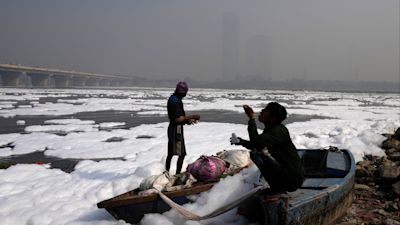Calls for a pollution lockdown in India as toxic smog forces schools to close

Officials in India are considering locking down parts of the country in a bid to tackle high pollution levels.
Trucks carrying non-essential goods have already been banned from entering New Delhi and surrounding areas until Sunday, in an effort to contain the smog.
Some coal-burning power plants were also shut down by the government in New Delhi and neighbouring states, as India's highest court looks set to lock down parts of the country.
An anti-pollution lockdown would be a first of its kind in the country, which implemented Covid lockdowns throughout 2020.
As well as school closures, construction and demolition works have been halted for at least a week by India's Commission for Air Quality Management.
State governments will encourage people to work from home, with guidance for half of private company employees to avoid travelling to the office.
More industries and businesses could be forced to close in the Indian capital as part of restrictions, with pollution levels seven times higher than the United Nations safe limits.
But some experts think an anti-pollution lockdown would be ineffective.
Anumita Roychowdhury, executive director at New Delhi's Center for Science and Environment, said a lockdown would do more harm than good.
“This is not the solution that we are looking for, because this is hugely disruptive
"We also have to keep in mind that the economy is already under pressure, poor people are at risk", he said. The air quality is expected to get even worse but meteorologists say the arrival of cold winds next week could blow away the smog.
India's Supreme Court has called the pollution situation a "crisis", and ordered state and federal governments to take emergency measures earlier this month. Smog is often heavy during winter time in the region, when crop-burning coincides with cooler temperatures that trap deadly smoke. Pollutants from firecrackers during festivals also lead to emissions. New Delhi - which is home to over 20 million people - consistently ranks as one of the most polluted cities in the world. More than one million Indians die every year from air pollution-related diseases, and pollution is seen as a key issue for India's politicians.
New Delhi's government has experimented with anti-pollution measures such as limiting the number of cars on the road, using large anti-smog guns and halting construction activity but the steps have had little effect.